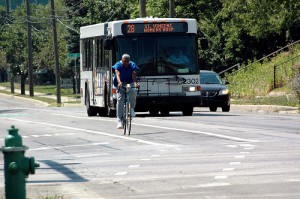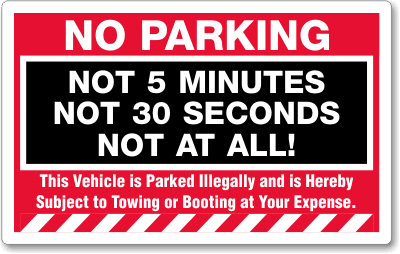Sidewalk parking raises ire in Indianapolis
On April 10, Urban Indy, a blog dedicated to urban design issues in Indianapolis, IN, published a post lambasting the Conrad and Alexander hotels, which cater toward luxury or business clientele, for allowing sidewalk parking on the walks that front the buildings.

On one hand, Indy has won praise for its uncommonly successful parking privatization. On the other hand, WalMart has to ask to have less parking. What’s going on? Via bnpositive; licensed under Creative Commons.
The fiery post came just two days after Smart Growth America lauded the city for its comprehensive Complete Streets policy, regulations that support the belief that streets should be designed and operated for the safety of all users—pedestrians, cyclists, those with disabilities—not just drivers. The Indiana chapter of the nonprofit AARP (formerly the American Association of Retired Persons) joined with several other nonprofits to push the legislation through to the City-Council of Indianapolis and Marion County, which unanimously passed the ordinance last August.
When comparing 124 other cities that passed similar measures in 2012, Smart Growth America put Indianapolis at the top of competing metropolises that included San Antonio, TX; Trenton, NJ; and Santa Fe, NM. The advocacy group’s recognition followed on the heels of last month’s enthusiastic nod from The Atlantic, which praised the city for a privatized parking scheme that has so far netted Indianapolis $1.4 million in parking-related revenue—more than double the average $600,000 the local government brought in in recent years.
The accolades suggest that a city long known for its car-racing, driver-focused culture has turned a corner. AARP’s online magazine has even dared to describe Indianapolis as “on the verge of a transit renaissance,” citing the growing interest in a potential light-rail system linking the suburbs to the city’s downtown, higher transit ridership on its IndyGo buses, and strong support for bike commuting.
Indeed, since Mayor Greg Ballard took office, the city has seen exponential growth in its bike lanes: from less than a mile in 2007 to more than 64 miles of lanes and trails today, with plans to double that figure in the years ahead.

Indianapolis’s new bike lanes have won it plaudits from smart growth advocates… but its legacy parking policies are still works in progress. Via kennethkonica; licensed under Creative Commons.
Yet the Indianapolis Cultural Trail, a bike and pedestrian path that serves as the downtown hub for the city’s greenway system, finds itself accommodating cars, too. The trail, which runs along the main entrance of The Conrad, has recently been used for the hotel’s valet parking, with SUVs and sedans blocking the pathway.
The Alexander Hotel, located in CityWay, a newly opened mixed-use development that came about as a public-private partnership between Indianapolis, Marion County, Eli Lilly, and other businesses, has also hosted vehicles on its sidewalks.
Both actions threaten to weaken Indianapolis’s blossoming reputation as a site for progressive urban policies, as does Walmart’s request to the city last month for a variance to its parking regulations. The company, reviled by critics for its tendency to create asphalt landscapes wherever it locates its stores, wants less, not more, parking. Instead of the 275 parking spaces that Indianapolis’s zoning code demands, Walmart would like to provide 165 for the new store it proposes for the region.

The Conrad and the Alexander’s clients are lucky that Indianapolis doesn’t use violation stickers. Via myparkingpermit.org.
The city is currently in the process of revising its zoning code, so the parking minimums that triggered Walmart’s request may yet be altered to favor Complete Streets principles and so preserve and potentially enhance Indianapolis’s reputation for forward-thinking urban planning.





















